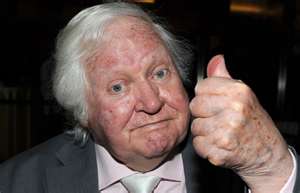 The visionary and prolific British filmmaker Henry Kenneth Alfred Russell, who left us on November 27, 2011 at age 84, remains an enigma. A devout Catholic and lifelong lover of classical music, “Ken” Russell directed many notable period dramas and literary adaptations, all of them quintessentially British in feel (it’s not for nothing that Russell titled his 1989 autobiography A BRITISH PICTURE) but for the fact that Russell’s films tended to revel in extravagance and excess — as did the man himself.
The visionary and prolific British filmmaker Henry Kenneth Alfred Russell, who left us on November 27, 2011 at age 84, remains an enigma. A devout Catholic and lifelong lover of classical music, “Ken” Russell directed many notable period dramas and literary adaptations, all of them quintessentially British in feel (it’s not for nothing that Russell titled his 1989 autobiography A BRITISH PICTURE) but for the fact that Russell’s films tended to revel in extravagance and excess — as did the man himself.
Ken Russell: The Facts
Ken Russell was a boisterous individual whose bushy-haired appearance and outrageous personality were unmistakable. He was a semi-prolific actor in films ranging from THE RUSSIA HOUSE to BROTHERS OF THE HEAD, and also a sometime novelist and critic. Yet it’s Russell’s self-directed films, which spanned a fifty year-plus career, for which he is and will be remembered.
Ken Russell was one of several notable filmmakers—Dario Argento, Andrzej Zulawski and Carmelo Bene among them—who challenged the popular conception that artistic merit is somehow synonymous with stately refinement. These visionary geniuses made films that unapologetically wallowed in all manner of excess, though it’s arguable that none of them did so with the finesse of Ken Russell, who combined a seemingly effortless grasp of the mechanics of filmmaking with an ability to shock and outrage that remains second to none.
When Brian DePalma, a guy who knows a thing or two about cinematic outrage, put out BODY DOUBLE in 1984 he was 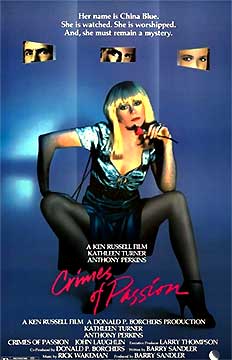 anticipating controversy that was far more subdued than expected. Why? Because Ken Russell’s CRIMES OF PASSION—with its very Russell-esque depictions of a glue-sniffing preacher, a sharpened dildo murder weapon and a cop sodomized with his nightstick—premiered that same year and handily stole BODY DOUBLE’S thunder. A similar thing occurred in 1991, when Russell’s aptly titled WHORE was released alongside Michael Tolkien’s Christian-baiting shocker THE RAPTURE. Although THE RAPTURE was admittedly the superior film, it was up against a provocation by Ken Russell and (to borrow a quote from NATURAL BORN KILLERS) it’s hard to beat the king.
anticipating controversy that was far more subdued than expected. Why? Because Ken Russell’s CRIMES OF PASSION—with its very Russell-esque depictions of a glue-sniffing preacher, a sharpened dildo murder weapon and a cop sodomized with his nightstick—premiered that same year and handily stole BODY DOUBLE’S thunder. A similar thing occurred in 1991, when Russell’s aptly titled WHORE was released alongside Michael Tolkien’s Christian-baiting shocker THE RAPTURE. Although THE RAPTURE was admittedly the superior film, it was up against a provocation by Ken Russell and (to borrow a quote from NATURAL BORN KILLERS) it’s hard to beat the king.
The Films
It’s true that Ken Russell’s films contain scenes of profound horror. Bonafide genre efforts like GOTHIC and THE LAIR OF THE WHITE WORM certainly contain their share of horrific elements, as do ersatz mainstream Russell films like the Tchaikovsky 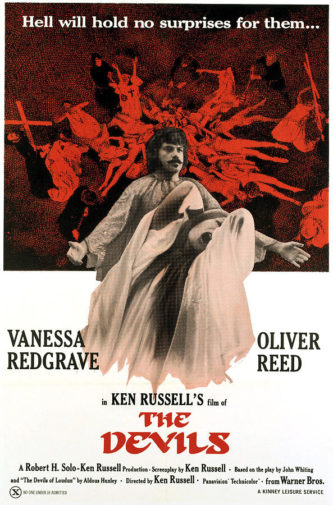 biopic THE MUSIC LOVERS (who can forget the sight of Glenda Jackson lowering her crotch onto a grating under which several lunatics are imprisoned, to the sounds of noisy sucking and licking?), the abovementioned WHORE (in which the heroine’s hubbie returns home from a night of drinking to puke in her salad) and THE DEVILS (a historic chronicle that is arguably Russell’s greatest “horror” film).
biopic THE MUSIC LOVERS (who can forget the sight of Glenda Jackson lowering her crotch onto a grating under which several lunatics are imprisoned, to the sounds of noisy sucking and licking?), the abovementioned WHORE (in which the heroine’s hubbie returns home from a night of drinking to puke in her salad) and THE DEVILS (a historic chronicle that is arguably Russell’s greatest “horror” film).
Yet in the Russell universe comedy was just as important as unpleasantness. Russell always claimed he wanted audiences to wonder whether his intentions were serious or not, and he succeeded in planting that seed in film after film. This means those of you who brand THE DEVILS and WHORE as “unintentional comedies” are sorely incorrect.
Of course none of the above would mean much if not for Ken Russell’s unsurpassed mastery of film technique. His best films have a clarity and imagination befitting a true master of the form, and have ushered in quite a few cinematic precedents. Russell’s 1960s-era BBC documentaries (ELGAR, DELIUS, DANTE’S INFERNO, etc) broke all sorts of rules, and his innovations didn’t end there. Take ALTERED STATES (1980), with its rapid-fire dialogue sequences interspaced with bursts of hallucinatory action. It’s been said that Russell utilized this technique as a way of lessening the work of screenwriter Patty Chayefsky, yet the film works smashingly well overall, and successors like Clive Barker and Stuart Gordon tend to direct in similar fashion.
In short, Ken Russell was one of the world’s most complex and multi-faceted filmmakers, with a style as distinct and recognizable as that of anyone. When, during preproduction on APOCALYPSE NOW, Francis Ford Coppola told the press he wanted the film to be “like a Ken Russell movie,” everyone seemed to know precisely what he meant.
Ken and the Critics
An entire book can written about Ken Russell’s treatment by critics. Unsurprisingly, most of them weren’t too complimentary to Russell’s films, crying about their “wretched excess.” To his credit, Russell was never shy about firing back, claiming the charges levied against him were identical to those that greeted the work of his favorite composers.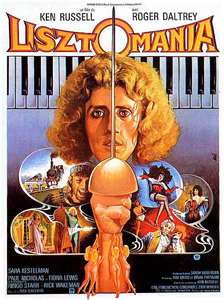
For most critics Russell’s best films were his stately D.H. Lawrence adaptations WOMEN IN LOVE and THE RAINBOW, in which the wildness is toned down somewhat, or his early BBC films. For this critic Russell’s finest work was in masterworks of outrage like THE DEVILS, DANCE OF THE SEVEN VEILS and LISZTOMANIA, arguably the wildest Russell movie of them all.
The latter two films were among Russell’s many classical composer biopics (others include SONG OF SUMMER, THE MUSIC LOVERS and MAHLER). Regardless of what you may think of those films, Russell deserves credit for making classical music fun and accessible…although that clearly is where Russell went wrong with reviewers. The “correct” treatment for such fare, I’d imagine, would be AMADEUS (1984), a composer biopic more in line with the refined sensibilities of most critics. As for myself, while viewing AMADEUS I couldn’t help but wonder, longingly, what Ken Russell might have done with the material.
R.I.P. Ken Russell. He’ll be greatly missed.
A Personal Ranking of Ken Russell’s Output by a Diehard Fan
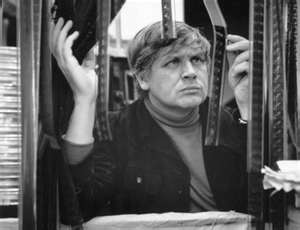 The Films:
The Films:
KNIGHTS ON BIKES (1956): An unfinished 5-minute short that I found too scant to properly judge.
PEEPSHOW (1956): Another short, which I found clumsy and amateurish in the extreme.
AMELIA AND THE ANGEL (1957): A RED BALLOON inspired 25-minute ditty about a little girl in search of angel wings. It did little for me.
ELGAR (1962): The first of Russell’s BBC documentaries, and an interesting avant-garde work.
FRENCH DRESSING (1964): Haven’t seen it.
BARTOK (1964): Likewise.
THE DEBUSSY FILM (1965): A film-within-a-film about Claude Debussy that’s uninvolving and distractingly self-conscious.
ALWAYS ON SUNDAY (1965): Another BBC biopic, and one of the stronger ones.
ISADORA DUNCAN, THE BIGGEST DANCER IN THE WORLD (1966): The most arresting and kinetic of Russell’s BBC productions (and much better than the Vanessa Redgrave feature on the same subject).
BILLION DOLLAR BRAIN (1967): A sixties curio that’s now painfully dated.
DANTE’S INFERNO (1967): Morbidly compelling; probably Russell’s most vital BBC production until DANCE OF THE SEVEN VEILS.
SONG OF SUMMER (1968): The most conventional and restrained—and so least interesting—of the BBC films.
WOMEN IN LOVE (1969): Russell’s most famous film, a refined and, frankly, rather dull D.H. Lawrence adaptation.
DANCE OF THE SEVEN VEILS (1970): The Holy Grail of all Ken Russell fanatics, his greatest and most outrageous BBC production.
THE MUSIC LOVERS (1970): I wouldn’t call this Tchaikovsky biopic “good,” but it is a jaw-dropping exercise in cine-madness.
THE DEVILS (1971): Russell’s masterpiece, an insane, surreal and altogether fascinating historical drama.
THE BOY FRIEND (1971): A film that boasts some truly awesome musical numbers, but which is otherwise wildly overlong and ponderous.
SAVAGE MESSIAH (1972): Overblown but satisfying.
MAHLER (1974): Another bawdy composer biopic, and an impressive dry run for LISZTOMANIA.
TOMMY (1975): A terrifically assaultive, phantasmagoric rock ‘n roll fantasy, although it must be experienced on a big screen to be fully enjoyed.
LISZTOMANIA (1975): Arguably the apotheosis of Russell’s composer bios, a demented masterpiece of surreal delirium.
VALENTINO (1977): One of Russell’s most notorious follies, but not all bad; the riotously disturbing prison sequence is unforgettable.
THE RIME OF THE ANCIENT MARINER (1978): Haven’t seen it.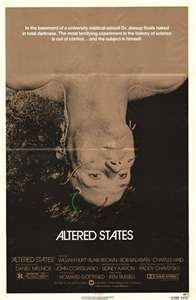
WILLIAM AND DOROTHY (1978): Haven’t seen it.
ALTERED STATES (1980): Awe-inspiring trippy entertainment, although (like TOMMY) it MUST be seen on a big screen to be fully appreciated.
THE PLANETS (1980): A so-so stock footage dramatization of Holst’s symphony that really could—nay, should—have been better.
CRIMES OF PASSION (1984): Another mind-scraping Russell freak-out, although it hasn’t dated well at all.
FAUST (1985): A thoroughly uninspiring video recording of a live opera…I guess you just had to be there.
GOTHIC (1986): A film as frenzied and surreal as nearly any you’ll see. Required viewing!
ARIA (1987): Russell directed a segment of this anthology film inspired by various operas that frankly isn’t much—the segment or the film!
KEN RUSSELL’S ABC OF BRITISH MUSIC (1988): Haven’t seen it.
SALOME’S LAST DANCE (1988): A solid dramatization of Wilde’s SALOME, with an unforgettable turn by the woefully underutilized Imogen Millais-Scott.
THE LAIR OF THE WHITE WORM (1988): An overrated film, although this bawdy horrorfest definitely has its moments.
MEPHISTOPHELES (1989): Haven’t seen it.
A BRITISH PICTURE (1989): A funny, endearing and fitfully outrageous free-form dramatization of Russell’s autobiography.
THE RAINBOW (1989): Another stately D.H. Lawrence adaptation that works better in parts than as a whole.
WOMEN AND MEN: STORIES OF SEDUCTION (1990): Russell directed a segment of this 4-parter that I haven’t seen.
THE STRANGE AFFLICTION OF ANTON BRUCKNER (1990): Haven’t seen it.
ROAD TO MANDALAY (1991): Likewise.
WHORE (1991): A thorough stinker, though it does contain many characteristic elements.
PRISONER OF HONOR (1991): A bland made-for-HBO dramatization of the Dreyfus affair, starring, appropriately enough, Richard Dreyfuss.
ANDREW LLOYD WEBBER: THE PREMIERE COLLECTION ENCORE (1992): Haven’t seen it.
THE SECRET LIFE OF ARNOLD BAX (1992): Likewise.
THE MYSTERY OF DR MARTINU (1993): Likewise.
LADY CHATTERLEY (1993): Yet another so-so D. H. Lawrence adaptation, and in many respects the least of the three.
THE INSATIABLE MRS. KIRSCH (1993): A 25-minute PG-rated erotic goof.
ALICE IN RUSSIALAND (1994): A fun, freewheeling documentary on Russian counterculture (beware: it’s paired with a deadly Jean-Luc Godard short).
CLASSIC WINDOWS (1995): Haven’t seen it.
KEN RUSSELL’S TREASURE ISLAND (1995): Likewise.
MINDBENDER (1996): A thoroughly ludicrous Uri Gellar biopic that provides some serious bad movie fun.
KEN RUSSELL IN SEARCH OF THE ENGLISH FOLK SONG (1997): Haven’t seen it.
DOGBOYS (TRACKED) (1998): Lackluster made-for-cable crap, notable only for the presence of the terrifically leggy Tia Carrere.
LION’S MOUTH (2000): Haven’t seen it.
ELGAR: FANTASY OF A COMPOSER ON A BICYCLE (2002): Likewise.
THE FALL OF THE LOUSE OF USHER (2002): A glorified home movie set in an inflatable castle—my God, what a tremendous piece of shit!
REVENGE OF THE ELEPHANT MAN (2004): Haven’t seen it.
TRAPPED ASHES (2006): Likewise.
The Books:
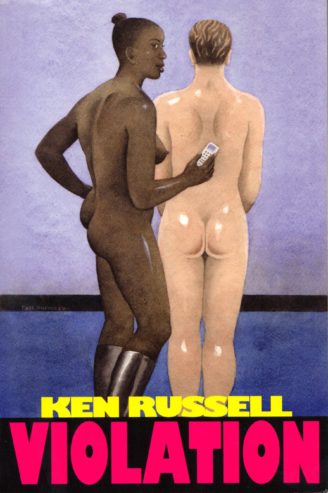 A BRITISH PICTURE (ALTERED STATES) (1989): Russell’s autobiography, and everything you’d expect from such a flamboyant individual.
A BRITISH PICTURE (ALTERED STATES) (1989): Russell’s autobiography, and everything you’d expect from such a flamboyant individual.
FIRE OVER ENGLAND (THE LION ROARS) (1993): A highly characteristic collection of humorous musings on British cinema.
MIKE AND GABY’S SPACE GOSPEL (1999): Russell’s first novel, a hilarious and endlessly quotable retelling of the Old Testament, reconfigured as a sci fi comedy.
DIRECTING FILM (2001): A collection of enjoyable anecdotes in the guise of a how-to text on filmmaking.
ELGAR THE EROTIC VARIATIONS & A MOMENT WITH DELIUS (2007): Haven’t read it.
BEETHOVEN CONFIDENTIAL & BRAHMS GETS LAID (2007): Likewise.
VIOLATION (2005): Russell’s final and best novel, an amazing X-rated futuristic freak-out.
